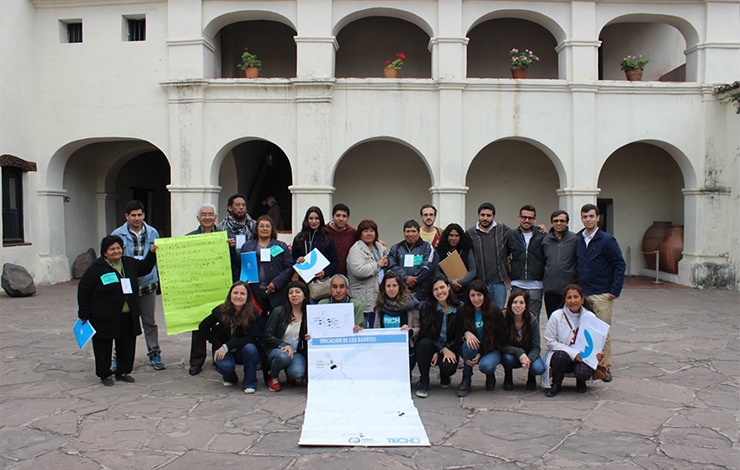This program addressed inequalities in housing policies in Argentina and Bolivia, largely resulting from informal settlements of Bolivian migrants in Argentina. The program developed a participatory planning process that convenes residents of informal settlements and public officials to respond to the challenges of informal settlement expansion.
Challenge

The last decade in Argentina has been positive in economic terms, creating employment and business opportunities but paradoxically, it has also experienced an expansion of informal settlements. This contradiction reflects the failure of housing and urban policies to allocate space for low income populations. Some studies consider that such expansion is mostly a result of the arrival of migrants from neighboring countries, especially from Bolivia, who occupy public and private land that is strategically located near job and business opportunities.
Historically, Argentina and Bolivia have been closely interlinked since the early 1940’s when Argentinean cities and towns experienced significant migration flows from Bolivian citizens in search of employment, educational opportunities and higher standards of living. Within Bolivia, the search for better opportunities has also been the key driver for the internal migration of rural workers towards the main cities. As rapid urban growth has strained the capacity of local and national governments to provide basic services, Bolivian migrants have usually settled in informal settlements and over-crowded slums in both countries. Evidence of the close connection between increased internal and external migration and the growth of informal settlements emerged in the last census. This has a serious impact on human rights, such as the right to decent housing, water and sanitation, and also in the case of migrants, potential discrimination and segregation. In both countries, current challenges are related not only to effectively guarantee migrants’ fundamental rights to adequate housing and basic urban services, but also to address discrimination against persons with a migrant background, as host communities competing for resources tend to perceive migrants as a threat rather than an opportunity for development.
In recent years, Argentina has adopted a new immigration law and a bilateral agreement with Bolivia that establishes that migrants and their families shall enjoy the same rights as nationals. Bolivia has also advocated for more human rights-centered policies, seeking to help rural migrants to settle in towns. However, while there have been some improvements over the years, there is a huge deficit in terms of Bolivian migrants’ effective access to fundamental rights and actual law enforcement.
There is a continuing trend towards rapid urban growth in multicultural cities in Argentina and Bolivia. Because of this, participatory planning strategies are critical to open a channel for dialogue and cooperation that will help to achieve social inclusion of migrants in parallel to safeguarding the fundamental rights of the whole population.
Program Summary
In this context, participatory urban planning offers a unique opportunity to strengthen the rule of law by:
- Participation: engaging migrants and local people in discussing urban and housing policies and specific projects with local authorities, ensuring that all policies and projects are appropriate to their needs and preferences.
- Action planning: developing housing and urban pilot projects that aim to enhance social cohesion and integration between migrants and host communities, unpacking their community dynamics through collaborative work.
- Human rights centered regulations: Using experience and taking into account the specific habitat problems related to migrants and displaced populations to shape urban regulatory frameworks respectful of multiculturalism as a tool for peace-making.
This project seeks to prevent informal settlements and enhance living conditions of low income communities, locals and migrants, by preventing human rights violations, empowering democratic exercise, and engaging slum dwellers and public officials in a productive dialogue to respond to the challenge of informal settlement expansion and the development of urban and regional planning that provides regulatory frameworks for urban expansion. “Participlan” is an activity that was carried out during 2013 in several municipalities of Argentina (Lujan, San Martin, etc.) with promising results. The project's success in Argentina created the interest to carry out a parallel program in Bolivia during 2014.The project consists of three key activities:
- Participatory workshop, in which the use of a tailored methodology of diagnosis and proposals, slum dwellers and public officials agree on an action plan to upgrade slums, build affordable habitat and modify regulatory framework to prevent slum formation, ultimately empowering the rule of law;
- Exhibition that is open for all citizens, presenting the case of territorial planning centered in human rights;
- Providing specific tools and methodologies to develop urban and housing plans based on collaborative efforts with the agreement of multiple stakeholders.
Impact
The impact of the project is expected in Argentina and Bolivia simultaneously in terms of:
- Expanding governmental power: Local governments who do participatory planning exercises have the legitimacy, technical consistency and authority to carry out plans in complex and normally contested issues.
- Fulfillment of fundamental rights: The direct participation of vulnerable communities in the planning process increases the possibilities of more durable solutions, as these groups will defend their rights based on the knowledge acquired through the “Participlan” experience.
- Open government: The whole society can learn about their governmental plans for urban expansion by participating in the activities or reading the publications in social media, specialized blogs and websites. “Participlan” works as a window to see how transparent, fair and smart the government plans are with their civil society partners.
- Regulatory enforcement: The exchange of these groups with academic, international, national and local organizations, will give hierarchy to introduce necessary changes in regulatory frameworks and ensure the rule of law.
- Create linkages between cities of Argentina and Bolivia: The activities will create synergies between government and organizations in both countries helping to work together in finding adequate legal mechanisms to promote human rights.
Partners
- The research program IDUS (Sustainable Urban Development), University of Buenos Aires
- International Organization for Migration (IOM)
- Various other municipalities and community based organizations

